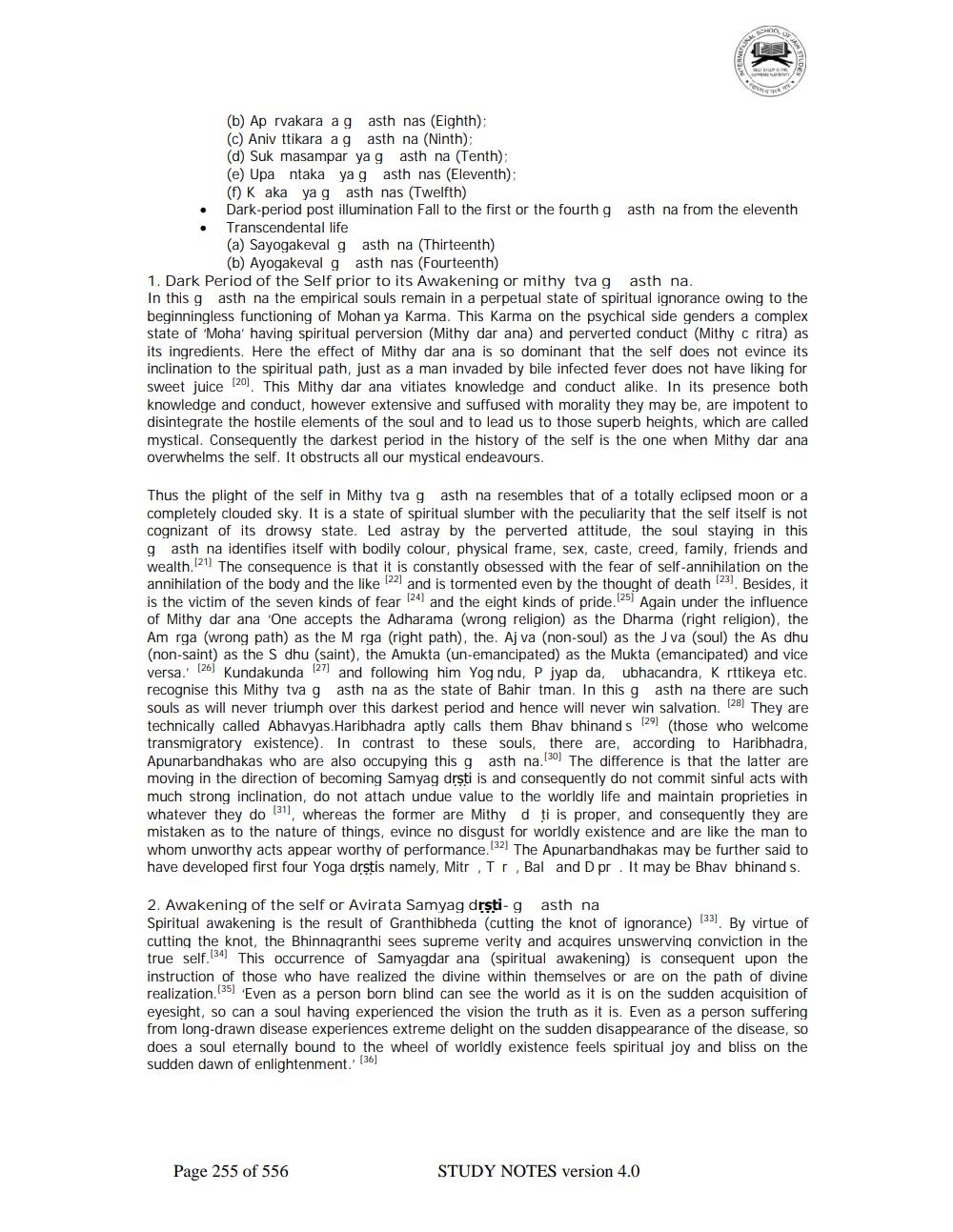________________
(b) Aprvakara a g asth nas (Eighth); (c) Aniv ttikara agasth na (Ninth); (d) Suk masampar ya g asth na (Tenth) (e) Upa ntaka yag asth nas (Eleventh); (1) K aka ya g asth nas (Twelfth) Dark-period post illumination Fall to the first or the fourth g asth na from the eleventh Transcendental life (a) Sayogakeval g asth na (Thirteenth)
(b) Ayogakeval g asth nas (Fourteenth) 1. Dark Period of the Self prior to its Awakening or mithy tva g asth na. In this g asth na the empirical souls remain in a perpetual state of spiritual ignorance owing to the beginningless functioning of Mohan ya Karma. This Karma on the psychical side genders a complex state of 'Moha' having spiritual perversion (Mithy dar ana) and perverted conduct (Mithy c ritra) as its ingredients. Here the effect of Mithy dar ana is so dominant that the self does not evince its inclination to the spiritual path, just as a man invaded by bile infected fever does not have liking for sweet juice 120. This Mithy dar ana vitiates knowledge and conduct alike. In its presence both knowledge and conduct, however extensive and suffused with morality they may be, are impotent to disintegrate the hostile elements of the soul and to lead us to those superb heights, which are called mystical. Consequently the darkest period in the history of the self is the one when Mithy dar ana overwhelms the self. It obstructs all our mystical endeavours.
Thus the plight of the self in Mithy tva g asth na resembles that of a totally eclipsed moon or a completely clouded sky. It is a state of spiritual slumber with the peculiarity that the self itself is not cognizant of its drowsy state. Led astray by the perverted attitude, the soul staying in this g asth na identifies itself with bodily colour, physical frame, sex, caste, creed, family, friends and wealth. The consequence is that it is constantly obsessed with the fear of self-annihilation on the annihilation of the body and the like 122) and is tormented even by the thought of death 23). Besides, it is the victim of the seven kinds of fear (24) and the eight kinds of pride. 25) Again under the influence of Mithy dar ana 'One accepts the Adharama (wrong religion) as the Dharma (right religion), the Am rga (wrong path) as the M rga (right path), the. Aj va (non-soul) as the Jva (soul) the As dhu (non-saint) as the S dhu (saint), the Amukta (un-emancipated) as the Mukta (emancipated) and vice versa. (26) Kundakunda (27) and following him Yog ndu, P jyap da, ubhacandra, K rttikeya etc. recognise this Mithy tva g asth na as the state of Bahir tman. In this g asth na there are such souls as will never triumph over this darkest period and hence will never win salvation. [28] They are technically called Abhavyas. Haribhadra aptly calls them Bhav bhinand s129 (those who welcome transmigratory existence). In contrast to these souls, there are, according to Haribhadra, Apunarbandhakas who are also occupying this g asth na.30) The difference is that the latter are moving in the direction of becoming Samyag drsti is and consequently do not commit sinful acts with much strong inclination, do not attach undue value to the worldly life and maintain proprieties in whatever they do 131, whereas the former are Mithy d ti is proper, and consequently they are mistaken as to the nature of things, evince no disgust for worldly existence and are like the man to whom unworthy acts appear worthy of performance."- The Apunarbandhakas may be further said to have developed first four Yoga drstis namely, Mitr Tr. Bal and D pr. It may be Bhav bhinand s.
2. Awakening of the self or Avirata Samyag drsti-g asth na Spiritual awakening is the result of Granthibheda (cutting the knot of ignorance) 133). By virtue of cutting the knot, the Bhinnagranthi sees supreme verity and acquires unswerving conviction in the true self. 34 This occurrence of Samyagdar ana (spiritual awakening) is consequent upon the instruction of those who have realized the divine within themselves or are on the path of divine realization. 'Even as a person born blind can see the world as it is on the sudden acquisition of eyesight, so can a soul having experienced the vision the truth as it is. Even as a person suffering from long-drawn disease experiences extreme delight on the sudden disappearance of the disease, so does a soul eternally bound to the wheel of worldly existence feels spiritual joy and bliss on the sudden dawn of enlightenment. [36]
Page 255 of 556
STUDY NOTES version 4.0




